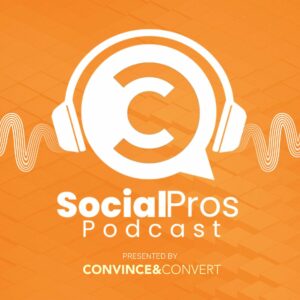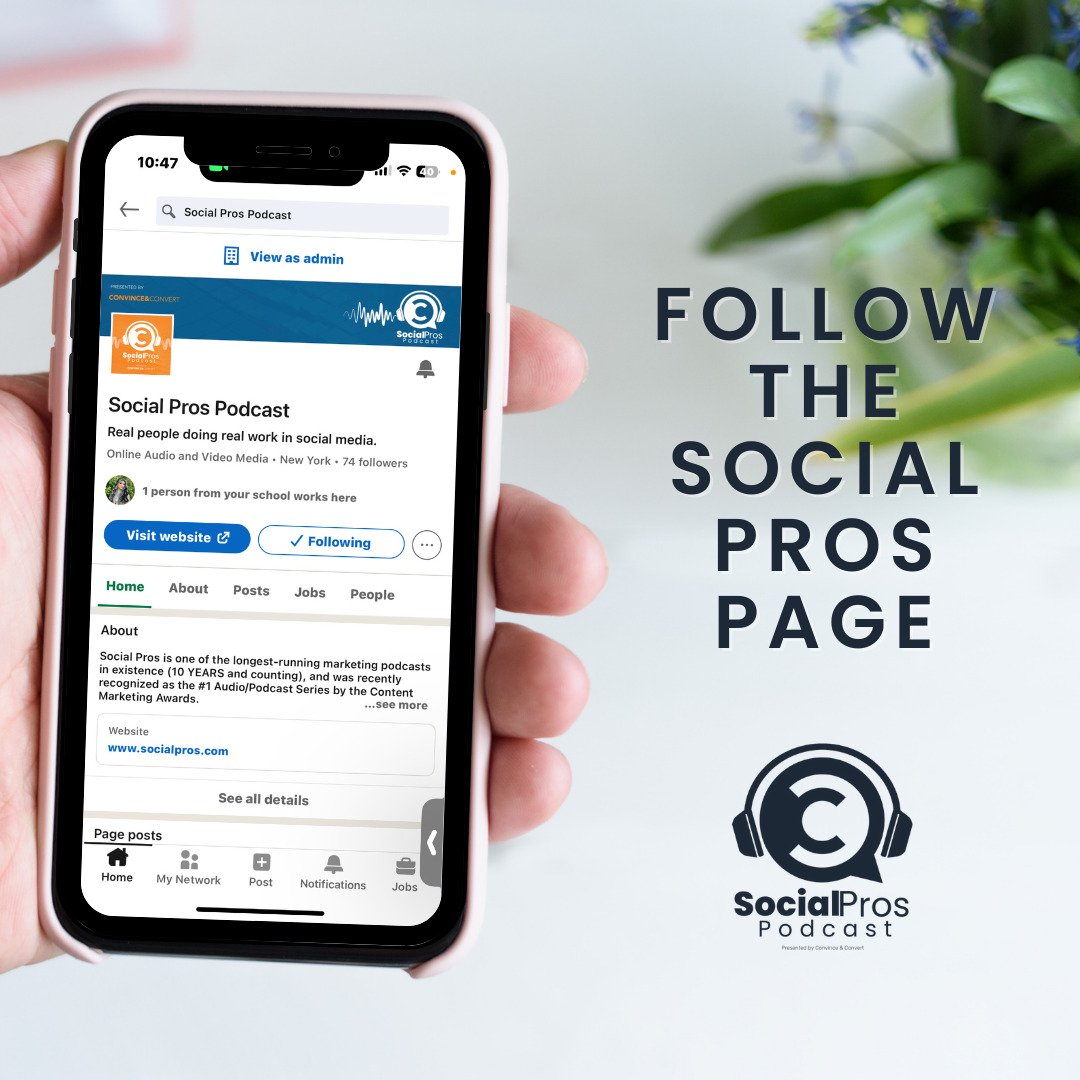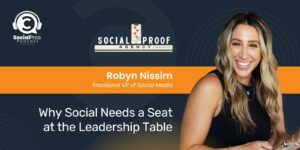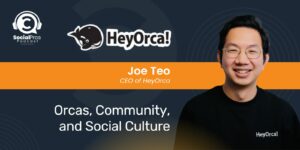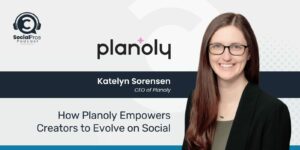Hosted By
About Social Pros Podcast:
Social Pros is one of the longest-running marketing podcasts in existence (10 YEARS and counting), and was recently recognized as the #1 Audio/Podcast Series by the Content Marketing Awards.
Our purpose? Making sure that we speak to real people doing real work in social media.
Listeners get inside stories and behind-the-scenes secrets about how teams at companies like Google, Reddit, Glossier, Zillow, Lyft, Marvel, and dozens more, staff, operate, and measure their social media programs. With 600+ episodes, the Social Pros Podcast brings the humanity of social media to the forefront, while providing incredibly useful marketing strategies that listeners can immediately implement.
Follow Social Pros on LinkedIn.
To inquire about becoming a guest or show sponsor, please email our Executive Producer, Leanna Pham, at leanna@convinceandconvert.com.
Apple Podcast Reviews:
The Social Pros podcast has quickly become a favorite in my feed! I'm consistently impressed by the engaging conversations, insightful content, and actionable ideas. I truly learn something every time I listen!
@Arlie KThis is absolutely an awesome listen for anyone in communications or social media!!
@Will31CThis podcast has become one of my staple weekly podcasts for learning about marketing! Love the conversations that they have and it's always enjoyable and educational!
@Simonstone95Love the podcast - informative, in depth and spot on for any business size.
@MissTriathlon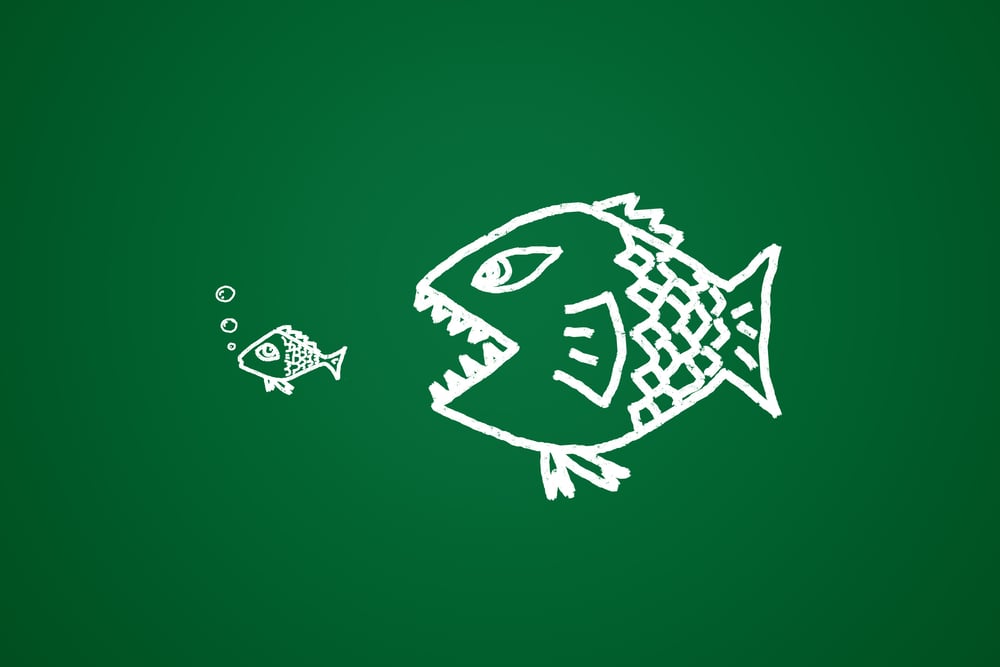
This is Episode 19 of the Social Pros Podcast : Real People Doing Real Work in Social Media. This episode features Scott Stratten of UnMarketing. Read on for a special episode, live at BlogWorld NYC, with insights from Scott and Jim about the future of self-publishing vs. traditional publishing. Listen Now Click the play button to […]
 This is Episode 19 of the Social Pros Podcast : Real People Doing Real Work in Social Media. This episode features Scott Stratten of UnMarketing. Read on for a special episode, live at BlogWorld NYC, with insights from Scott and Jim about the future of self-publishing vs. traditional publishing.
This is Episode 19 of the Social Pros Podcast : Real People Doing Real Work in Social Media. This episode features Scott Stratten of UnMarketing. Read on for a special episode, live at BlogWorld NYC, with insights from Scott and Jim about the future of self-publishing vs. traditional publishing.
Listen Now
Click the play button to listen here:
[podcast]http://socialpros.podbean.com/mf/web/t8dxtr/SocialProsEpisode19.mp3[/podcast]
Download the audio file:
http://socialpros.podbean.com/mf/web/t8dxtr/SocialProsEpisode19.mp3
The RSS feed is: http://feeds.feedburner.com/socialprospodcast
Find us on iTunes: http://itunes.apple.com/us/podcast/convince-convert-blog-social/id499844469
Please Support Our Sponsors
Huge thanks to data-driven social media management software company Argyle Social for their presenting sponsorship, as well as Infusionsoft, Janrain, and Jim Kukral at DigitalBookLaunch. We use Argyle Social for our social engagement; we use Infusionsoft for our email; Janrain is our crackerjack social integration company, and Jim is our guest host for the podcast (and a smart guy).
Social Pros Transcript For Your Reading Enjoyment, Thanks to Speechpad for the Transcription
![]()
Jay: Hey! Here we are with episode 19, of Social Pros Live. From BlogWorld Expo in New York City it’s Jay Baer joined today by my co-host Jim Kukral, from DigitalBookLaunch.com. Jim, how are you good sir?
Jim: I’m doing great. It’s great to be here in this crowded noisy room. Hopefully everyone can hear us.
Jay: Eric is at home today, keeping the Argyle Social flames a burning. Thanks always to Argyle Social for sponsoring the podcast, also from Infusionsoft, Janrain, and of course Jim Kukral himself, at Digital Book Launch.
Jay’s Thought of the Week
Jay: An interesting week in social media, as we’re sitting here in BlogWorld, really faceting all the buy-outs. All of a sudden it’s merger mania, in the social media software business, just in the last few days. Vitrue snapped up for $300 million, Buddy Media for $690 million. This morning CollectiveIntellect bought by Oracle, for terms undisclosed, but presumably a bunch of money. So, my question Jim, is if all of these companies are being bought and rolled up into enterprise software platforms, Oracle, Salesforce.com, etc. What’s left for the mid market?
You’ve got the low market stuff, Hootsuite and services like that, but for your mid-size companies, what are they going to do? There’s not going to be any software for the mid-market anymore, and I’m not sure what we’re going to do about it. There’s a huge market opportunity for somebody, but the mid-market is going to get flat screwed in this M&A route.
 Jim: Yeah. I think that you’re still going to get people that are going to integrate, and come up with a solution. The market always feeds itself, you know. Somebody is going to come up with a good mid-market solution that’s going to come out and just kick butt, and fill that space. So, I think it’s just a matter of time before somebody steps up and decides that they can fill that space and do that. Because you’re exactly right, everything is being bought out, and it’s all getting pushed out to the higher level enterprises.
Jim: Yeah. I think that you’re still going to get people that are going to integrate, and come up with a solution. The market always feeds itself, you know. Somebody is going to come up with a good mid-market solution that’s going to come out and just kick butt, and fill that space. So, I think it’s just a matter of time before somebody steps up and decides that they can fill that space and do that. Because you’re exactly right, everything is being bought out, and it’s all getting pushed out to the higher level enterprises.
Jay: Not every company wants a giant CRM platform. They just want to be able to manage their Facebook page.
Jim: Yeah, a lot of companies can’t afford a $5,000 a month platform. You’re absolutely right. But you know, you have smaller, nimbler companies. I mean I love 37signals, this is a company that’s maintained, and provides good mid-level solutions across all boards. So, look at a company like 37signals, you get a good company like that, with good solutions, good products and they’ll continue to just innovate and keep that market space open.
Social Media Stat of the Week: Only 33% of Americans Have Followed a Company in Social Media
Jay: This new research, the social habit was put out just today, as a matter of fact. Lots of stats, in fact we’ll have a blog post on Convince and Convert, in about it this week. But the one who really struck me the most, is that only 33% of Americans have ever followed any sort of company in social media. So, that means 2/3 of Americans have never followed a brand on Twitter, have never followed a brand on Facebook, have never subscribed to a company’s YouTube channel. I don’t know what I was expecting, but I wasn’t expecting that.
Jim: Yeah, that seems really small, doesn’t it? But I think when you really look at the world as it exists, we’re in this bubble. I think that’s why we’re surprised by it. Real, regular people aren’t into all this stuff as much as we are, just not as engaged with these brands, as we are. I think a lot of things are going on in the world right now, there’s “Beiber-session” going on, I think a lot of people are really focused on themselves, and figuring out how they’re going to make their next paycheck, and really not so much worried about connecting with Coca-Cola, as much as they used to. You know?
Jay: Yeah, I think there’s a couple of reasons for that. I mean one, I would argue that brands have not, in large measure, done a very good job in giving people a reason to connect with them.
Jim: Yeah.
Jay: And two, we don’t necessarily, inherently want companies to be part of social media, right? We want to connect with one another, we want to connect with our friends and our loved ones and family, and all that. Companies are just the ones that are sort of paying the freight. They’re the ones that are sort of keeping social media free, they’re not necessarily inherently welcome into the space. I think about, as I said, I was shocked when I saw that stat this morning. But maybe you’re right Jimmy, maybe we’re in the bubble. Because I think about my mom, and I wonder if my mom, who’s a fairly active Facebook user. I wonder if she follows any companies or ever has. That’s interesting.
Jim: I don’t think, I mean obviously, your mom’s age group, I don’t think they get that concept. You like something, but you don’t go out and physically touch the like button on it. I think that concept is just really foreign to them. As far as everybody else, I just don’t know, you’re right. I don’t think companies are doing that great of a job, making the case for why you should really like their brand. They need to do a much better job.
Special Guest: Scott Stratten, UnMarketing
Jay: A very special guest today on the Social Pros podcast. Our friend and honorary, and official Canadian Scott Stratten, author of “UnMarketing”
and the forthcoming book, “The Book of Awesome” and “The Book of Business Un-Awesome” I think I may have butchered that. Actually just a moment ago, here at BlogWorld in New York, Jim Kukral who’s sitting to my left, and Scott Stratten who’s also sitting to my left, did a stirring debate, on the merits of traditional publishing. Using a traditional publisher versus self-publishing. We’re going to get into that a little bit here, and talk about that. Scott, thanks for being part of Social Pros.

Scott: I am happy, and happy to be honorary Canadian, and part of this. It is a show I listen to religiously, although I agree with nothing you say, I find it riveting anyways. So thank you.
Jay: We’re glad that we can disappoint you each week at Social Pros, Mr. Scott. That’s fantastic. So let’s get right into it. It was a really interesting session, I thought, and really good feedback on this traditional versus self-publishing debate. You guys come at it from both perspectives, Jim has done both actually, published traditionally first, and then self publishing route. Jim, what is your case for the self publishing model?
Jim: Well, the session was all about options for people. What your goal is for the book that you want to write, and what your long term goals are. Then there’s the future of it all, and Scott comes at it from a different perspective, because he’s really good at doing it at the traditional route, I didn’t have as much success with my traditional book as Scott did. Probably because I didn’t work as hard to sell the book. And Scott wrote a really awesome book. Mine was awesome, just not as awesome. But, everyone needs to decide what they want to do, like they’ve got to decide the reasons they’re writing their book. Then think about the future, are they building a business around the book, or are they just doing it for vanity reasons? And you need to think about those things, that’s the entire point of this conversation. Think about what you want to do, so in the future you make the right decisions.
Jay: Scott, you talked a little bit about there being an credibility gap, between traditional and self publishing. Do you want to elaborate on that a little bit?
Scott: I don’t know what the view will be in five years, I know what it was five years ago, and I know what it’s like now. When it comes to, especially a corporate audience, when you mention you are publishing a book, they’ll ask you right away, “Who’s your publisher?” Because they’ve been dealing with this type of stuff for a long time. When you say self-published, you kind of get this look of, “oh that’s nice.” But if I say there’s credibility to that. It lends itself, to what they call social proof. It’s a third party endorsement, that if your content is good enough, we’re going to put some money into this. It’s like when a company that get a venture capitalist or something, someone investing in them. Well they’ve got to have something now, because somebody says it’s worth my money. So when somebody sees that it’s worthwhile, that budget if it’s got to have something behind it. There’s still some “cred” to that, as far as I can see.
Jay: One of the other things we talked about in the session was the presence of books on store shelves. That traditional books still appear on store shelves, self published books do not, as a general principle. Jim, you made the case that you think that doesn’t really matter anyway.
Jim: You know, I don’t think it’s got to matter, as much. There are still bookstores, I just don’t, I firmly disagree with Scott and other people. I do not believe that you’ll be able to walk into a Barnes & Noble superstore in two or three years. Maybe there’s one or two dinosaurs left.
Jay: Maybe there will be an Amazon store, like we have the Apple store.
Jim: Actually, that’s exactly what’s going to happen. You’re going to have lending libraries, and you’re going to have things line Netflix of books, which is what Amazon probably started doing with their prime program. And you’re going to have reading areas, where you can go and sample books online, but you’ll be able to go into rooms like this, and browse books and decide to get them right on your device right there. So, we just kind of disagree on the future. I agree though, right now, there still is value in having your book in a book store, if you can get it. It’s not as easy as Scott makes it out to be.
Scott: Well the angle for me is, that I have to talk about the now, it’s all I’ve got. What has happened for me in the past 18 months.
Jay: You’re not a futurist, you’re a past-ist.
 Scott: No, I’m a past-ist, and a poor one at that. So, for me, I know that if my books ever sold 10,000, we’re off the shelves of bookstores. That’s something I want, something I need to see that they’re going to hit those with both hands. And if three years from now, four years from now, there is no big box bookstores anymore, only little niche ones or whatever, my debate changes. A lot of the weight and things I’ve got, it does change. If I lose that shelf, then that whole power of distribution, which is what record labels have already become, which they’ve lost that now, because of Itunes and everything else, which is what they have turned into. Publishing is distribution, but it’s the doors that they open with that distribution, that to me, today 2012, is still relevant.
Scott: No, I’m a past-ist, and a poor one at that. So, for me, I know that if my books ever sold 10,000, we’re off the shelves of bookstores. That’s something I want, something I need to see that they’re going to hit those with both hands. And if three years from now, four years from now, there is no big box bookstores anymore, only little niche ones or whatever, my debate changes. A lot of the weight and things I’ve got, it does change. If I lose that shelf, then that whole power of distribution, which is what record labels have already become, which they’ve lost that now, because of Itunes and everything else, which is what they have turned into. Publishing is distribution, but it’s the doors that they open with that distribution, that to me, today 2012, is still relevant.
Jim: I love that line from the social network. Where he said “Are you still interested in buying a Tower Records Franchise?” I mean the same thing is happening right here, right now. It’s just that bookstores, are you interested in opening a Barnes & Noble right now? I mean, let’s be honest.
Jay: No, I would not invest in a Barnes & Noble.
Scott: But I do think they’re similar, and my background is in the music business, so I do think there’s similarities to it. Record labels used to have all the cards, all the power. They didn’t necessarily always make better music, but I do think listening to music, is almost delivery vehicle irrelevant. An MP3 or CD or anything, as long as you’re hearing it. I still see a resistance, and again, three years from now it may be different, but I still see resistance in people reading on a screen, versus a book in their hand. Again, you’re grasping at straws sometimes, at the industry. But there’s a point where we asked the room today, the majority of this room still buys paper books, so today, it’s still relevant. Three years from now, I have no idea.
Jay: But as it relates to Amazon, I’m not sure that necessarily matters, because Amazon is very much getting into traditional pay to publishing as well. Right? So, I think there’s two issues here. One, what is better for you as a business person, self or traditional, as one of the things we were talking about. I think if you want more money now, and your end game is to make money from a book, I think there’s no question that self-publishing makes a lot of sense. If your end game is that your book is a means to an end – more speaking, more consulting – then maybe you could argue the traditional side. But with Amazon’s increasing hegemony over the industry, both in paper and traditional, do we get to the point where it doesn’t matter? If Amazon publishes the lions share of paper books and the preponderance of digital books, at that point, do all of these distinctions fade away?
Scott: And that’s where once Amazon becomes the only place, in theory, iTunes is really the only place for music right now, they’re certainly there. When you break down my stuff, 10,000 off the shelves, 10,000 copies sold from Amazon. So I know exactly that power that’s coming through there. So the power is still in the book, and it makes the bookstore irrelevant, eventually. It’s going to get to that point, and everything does progress as we do move. It’s scary for starters, but right now, that power to me, is that shelf space.
Jim: What’s happening, and we all will agree on this, the platform is what you have to have. The future is exactly what J.K. Rowling just did. She went direct, so she said screw you publisher, and screw you Amazon, and I’m going to go sell it directly to my fans. And that is the real future for authors, because everybody is going to be a marketer, and years from now Scott may be doing that on his own. He may say “You know what? I don’t even need that. I don’t need my publisher anymore, I just wrote this 100,000 word book, and I’m just going to sell it to my 100,000 fans myself.
Jay: Well not even in the future, I mean look at somebody like Danny Brown. Who has an ebook on his site, available for a few dollars, and it’s not even on Amazon. Chris Penn, same thing.
Scott: It depends on what your end game is. Because I actually put out an ebook, “Build your Following” a couple of years ago, which interviewed a bunch of speakers, and what they all did differently, 40 interviews in there, enough content for a book. But I made it simply a PDF, straight from my site. All because I wanted to build a list, that’s the only tool there was. So what is your end game? I didn’t want to make money from that, I wanted to build a list that knew value. But then I played off that list when the book came out.
Jim: Absolutely.
Scott: So it really is, what is your end game. If it’s to make money from copy one, that’s different. But if you get any kind of sizable asset, that’s a nice thing. I’ve made a lot of money through this book. Now would I have made more with the same number of copies, or self published? Of course. But I would not have sold nearly the same number of copies, if I went self published to move that book. So, you’re weighing it out.
Jay: That axis crosses at some point.
Scott: 5,000 self published, 30,000 traditional. Is that almost even. So then what are we arguing now?
Jay: Well, what’s your take? like $4.00 or something roughly, per copy, is the basically, how you calculate it?
 Scott: Well, I made $80-$90,000 up front, off the first book. And that was something, I was smart about it, I talked to people and authors, and they said don’t expect anything above your last. I went with that. So every check is, oh, I’m going to buy myself a new TV with these things. But again, I have made money, and I know most authors don’t. The same with musicians, they don’t make money, they make money off touring. Musicians are about getting their music out there. Yeah, and T-shirts. $40 Van Halen shirts they had last week in Vegas. They’re making their cake on that versus the CD itself.
Scott: Well, I made $80-$90,000 up front, off the first book. And that was something, I was smart about it, I talked to people and authors, and they said don’t expect anything above your last. I went with that. So every check is, oh, I’m going to buy myself a new TV with these things. But again, I have made money, and I know most authors don’t. The same with musicians, they don’t make money, they make money off touring. Musicians are about getting their music out there. Yeah, and T-shirts. $40 Van Halen shirts they had last week in Vegas. They’re making their cake on that versus the CD itself.
Jim: Did they cancel their tour?
Scott: At the end of June, they’re changing some stuff or whatever.
Jim: Talk about somebody who should have wrote a book, it’s those guys.
Scott: Sammy Hagar’s first book is amazing. I read that as a physical copy, but I got from Amazon. So that’s all I order. But you made a good point in the topic. Which was in traditional publishing, the job is to sell paper. Music business, the job is to sell plastic. Right? And everything has changed since plastic became irrelevant. Once paper becomes irrelevant, I no longer have a good debate.
Jim: It would be interesting if we could do this like in three years again.
Scott: That’s what I mean.
Jim: And see where we all are.
Jay: We’ll put Episode 19 of the Social Pros podcast in a time capsule.
Scott: It might be eight years. It might be one year. It might be next month. We don’t know when it is. So when you look at it and say, “Well now, what do you want to do right now,” and that’s what we have to look at. Even social in general, we so much at what’s next, what’s next. You’ve got to haul some ass now. Make now better, and whatever tools we’ve got now.
Jay: Let’s talk about the social side of it. Do you think it’s easier to use social media to promote a digital book versus a hard cover paper book, inherently?
Scott: I think it’s easier to promote through Amazon. It’s so easy to promote. I do everything myself. There’s so much with Amazon. So you choose Kindle. You choose deliver book. It’s so much easier. Plus when I put my Amazon affiliate link, I think I make more money than the royalty on that thing anyway. So I’m pretty happy. I make some money. So I like that. My whole thing is I don’t believe social necessarily will make people go walk to a bookstore. It’s two different worlds, right? Virtually, I’m on something. I am there. I want to make the least steps possible for you to grab my product, whatever product that is. That means the short link to Amazon, an immediate mobile friendly site. That’s what I want, I do not want to push people on Twitter to Barnes & Noble necessarily. I want the path of least resistance that leads to my book.
Jim: Yeah. You put the content out there and you let people consume it how they want to consume it, which is what we always tell clients when we do social media stuff. We’ll do that. They’re going to let them decide how they want it. They’re going to decide. It’s not up to you anymore. You can’t shove it down their throats on a television commercial anymore.
Scott: It’s like making your blog just totally RSS feed, and then saying everybody has to go that way. It’s not how we all consume this content. It’s the same thing with reading or an audio book or something else. I don’t learn that way, but my learning method has nothing to do with it at all. It’s got to be what our audience wants.
Jim: In terms of selling the book with social media, I mean people don’t buy my books because I go on Twitter and say, “Hey, go buy my book,” which I will do that occasionally. But they buy because they have relationships. He does it differently than I do. He goes in and he’s really engaged with his audience, and it works really well for him. I’m not that guy. I’m not going to try and lie and do what he does. It wouldn’t work for me. I would fail completely miserably. I’m a distributor. I take information and I send it out to people, and people like that. They like getting the links and the information from me, and that’s why they follow. So it’s just a different agenda.
Scott: And that’s the problem with looking at best practices and case studies is that you’re not the same person as somebody else. You mentioned in the panel that nobody in this room is going to be me, and nobody is going to be you. We’ve all got to look at what our strengths are. How much are we going to be able to give to a social platform? How much can we do?
You could sell a million books if you do email list-building effectively. You pick the platform that you’re good or team is good at and do it. I planned that 30 city book tour, 10 weeks, all through Twitter. If you got on Twitter right now and said, “Who wants me to go on a book tour right now,” no one is going to say anything because you haven’t built up. It took a ton of effort to build that.
Jim: By the way that was insane. I still hold onto that.
Jay: Well, the same is true of brands. I have written in the past about we are so addicted to case studies, because it allows us to say well, look, somebody else did this. So if I screw it up, it was their fault. Or here’s proof that it’s not going to get screwed up. The number of times that that case study actually applies to your business is zero. Especially in something as circumstantial as social media where different or different types of companies have different customers and different expectations and different humanization and brands and personnel. There really is no point in saying, “Look, here’s somebody else did it” unless that company is exactly the same as yours.
Scott: I heard YouTube makes video viral. So let’s go make a video. Right?
Jim: He had a great example on his session this morning about the guy who had a video up there, and the number one comment was something like, “Hi, my name is…”
Scott: “I’m a douche bag.” Yeah.
Jim: It’s been up there for like six months. The guy put a video up there and never looked at it.
Scott: YouTube doesn’t make it successful or Twitter doesn’t make it successful.
Jim: It’s ridiculous.
Scott: Unless you can hire the exact person who ran the case study that you’re looking at, you never see the behind the scenes. That’s what people don’t see. They don’t see my 86,000 tweets. They see the one I just did now, that gets shared all over the place. “Hey, why aren’t they sharing my stuff?” Like you didn’t see behind the door there, what it took to get to that point.
Jay: As we talked about, the book gets published. It doesn’t necessarily sell. Right?
Scott: Right.
 Jay: You have to sell it. It is so much harder to market a book that to write a book, but I think it’s an interesting parallel for companies too. That it is so much harder to build a following first and then get that following to do something. Whether it’s download some sort of whitepaper for your company or sign up for a webinar or buy a product or advocate on your behalf. You’ve got to lay miles of groundwork with your customers and with your fans, before you call them to action. We’ve written about this and talked about it on the podcast, and Gary Vaynerchuk says it best. Too many companies are guilty of being a 19-year-old dude. They’re trying to close the deal on the first date. It’s like, look, you can’t just say, “Hey, here’s a tweet. Buy my stuff.” That’s what’s so funny about the whole GM not running Facebook ad. It’s like, you know what, if you’re trying to sell a car through a Facebook ad, you get what you deserve.
Jay: You have to sell it. It is so much harder to market a book that to write a book, but I think it’s an interesting parallel for companies too. That it is so much harder to build a following first and then get that following to do something. Whether it’s download some sort of whitepaper for your company or sign up for a webinar or buy a product or advocate on your behalf. You’ve got to lay miles of groundwork with your customers and with your fans, before you call them to action. We’ve written about this and talked about it on the podcast, and Gary Vaynerchuk says it best. Too many companies are guilty of being a 19-year-old dude. They’re trying to close the deal on the first date. It’s like, look, you can’t just say, “Hey, here’s a tweet. Buy my stuff.” That’s what’s so funny about the whole GM not running Facebook ad. It’s like, you know what, if you’re trying to sell a car through a Facebook ad, you get what you deserve.
Scott: Yeah, you’re doing it wrong.
Jay: You’re doing it wrong.
Scott: I tweeted 10,000 times before I said a word about what I sold or what I did. You have to build that social currency up. Nobody is sitting on Twitter of Facebook saying, “I’ve got to spend some money. I’ve got buy something.” We see relevancy. We see our communities, and we attach to those things and the work that goes into it. Social’s work. Anything’s work.
Jay: Well, that is the great irony of social is that it happens really fast, but results accrue really slowly. It’s a complete sort of mind screw-up for a company, because they think, “Well, jeez, I just sent this tweet in one second. How come nothing is happening?” It takes a long time for it to start coming back around, which is why this whole campaign mentality or how did we do this week or how did we do this quarter or how did we do these 30 days is really a poisonous mindset. You have to really think about what are we trying to achieve eventually? Not this week.
Scott: Conversation isn’t campaign strategy. It can’t be a campaign . When somebody asks me a book comes out, “How do I market it?” I say, “Take a time machine and go back a year ago.” Your job is to get your community excited about for the book. When I was writing the first one, in that 18 day span that I did, as I went along, I started tweeting a chapter, it was like, “What do you guys think about this title?” It created this buzz because I already built the community. If I opened a Twitter account today and said, “What do you think about my book,” nobody is going to say a word.
Jay: I called Gary Vaynerchuk before my book came out and I said, “Gary, you’ve been really successful selling books. Tell me how I sell the book.” He said, “You already have.” It was such a perfect sort of Gary thing to say. it was so true. it was like, “You know what? You’ve already sold all of the books you’re going to sell for the most part.”
Scott: You’ve already planted that seed.
Jim: Book marketing starts at book conception. The day you have the idea for the book is the day you start telling people about it and build your platform. If you wait, you’re toast.
Jay: That’s why the second book will be so much easier for you because you already have thousands of satisfied. It’s just like being a band. If the first album is good, now as long as you’re not in the sophomore slump, Scott Stratten.
Scott: I’m looking forward to it.
Jim: Well, he brought up a great point, Scott, in the session, which was, “Wouldn’t it be great if Amazon allowed us to announce the new book.” I think that’s coming. I think they’re going to do that in the next year. On behalf of you, everyone who has ever bought your book before, we’re going to send out a blast of those.
Jay: Why wouldn’t they do that?
Scott: They offer it. It’s just like a lot of money.
Jim: Yeah, it’s a ton of money. What I’m saying is, “Why wouldn’t they just do that?” I would love that.
Scott: Because that wouldn’t move books. Their job is to move books. Or are they making more money on Google just charging you for the blast. There’s a list. I don’t even know that I would pay for giving 16,000 total through Amazon and with the Kindle or book just to be able to sit, I would try to change plans for this.
Jim: But they’re in the business of making money, they’re not like Google. They’re not in the business of relevancy. They’re in the business of hard, cold cash. Every decision they make is based upon how much money they can make, pushing it out. They are going to eventually do it because it just makes too much sense.
Jay: I am a proud owner of Amazon stock. Keep up that cold, hard cash mentality, boys.
Jim: Which is exactly why Facebook stock…
Jay: Yeah, I have that too, I like to cover all of my bases. All right. This has been fantastic. Thank you very much for being here. Scott, do you have some Social Pros shout-outs as we wrap it up?
Social Pros Shoutout
Scott: Yeah, I have a couple of good guys out there. Really one that has fascinated me, the one in Denmark is a shipping line called Maersk.
Jay: They were on the Social Pros podcast, Maersk Lines.
Scott: That’s how I learned about them.
Jay: See how it works. It’s circular.
Scott: That’s how much I love it. If you haven’t listened to that podcast, listen to it.
Jay: We’ll link it up.
Scott: I phoned the guy. I phoned him in Denmark and said, “You need to talk to me right now and tell me how the hell you did this.”
Jay: He’s great.
Scott: You’re a container shipping line. Go listen to that podcast. If you guys could link to it, that would be perfect for the guys.
Jay: We’ll do it.
Scott: Look at what they’re doing, and it’s one of those things where I’m saying when you’re industry is know as not being awesome, it’s the best time to be there, because nobody else is doing it.
Jay: Talk about shattering expectations.
Scott: Go do it. Please check them out. You’ll do yourself a favor. Look at how they get likes and they get community, but they understand that social media is about being social, and it’s one guy.
Jay: One of the best Instagram programs I’ve ever seen too.
Scott: Twenty hours a week is total of what they do. There are 100,000 employees. A million people recognize the brand. One guy. You can do something like that. Just be awesome.
Jay: Fantastic. Anything else?
Scott: No, that’s good.
Jay: All right.
Scott: Let’s stick with Denmark for now.
Jay: Fantastic. As a quarter Danish, I appreciate your shout-out and thank you very much. Always good to see you. This will do it for Episode 19 of Social Pros.
Thanks again to our sponsors: Argyle Social, Infusionsoft, Janrain, and Jim Kukral with DigitalBookLaunch.com. We’ll be back next week, Episode 20. Tristan Handy, from Argyle, will be sitting in for Eric, myself, and our special guest next week is Katie Morse, Social Media Manager form Billboard. Speaking of the music industry, good segue there. Thanks to Jim. thanks to Scott. We’ll see you next time.
